
Publisher:
Bonnie King
CONTACT:
Newsroom@Salem-news.com
Advertising:
Adsales@Salem-news.com

~Truth~
~Justice~
~Peace~
TJP
Apr-07-2011 05:40


 TweetFollow @OregonNews
TweetFollow @OregonNews
Marine Corps Camp Lejeune Male Breast Cancer Survivor is 70th
Tim King Salem-News.comA story of survival against a series of battles... always insurmountable odds.
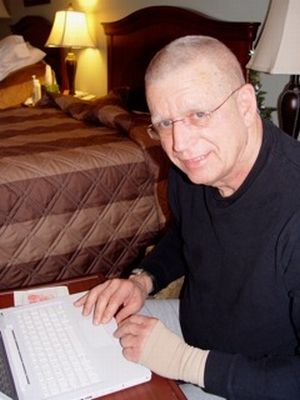 At the Hope House just outside of Philadelphia when Ed's hair is just regrowing after the Chemo treatments. |
(CAMP LEJEUNE, N.C.) - The first time I heard about the accumulating number of male breast cancer patients connected to the Camp Lejeune Marine Corps Base in North Carolina, I had the same picture in my head that most people do; I saw the most striking contrast possible when considering this disease that mostly affects women, raging inside the bodies of the nation's most steely warriors.

I never would have imagined that I would now be writing the story of the 70th man who served at or lived aboard Camp Lejeune, who developed breast cancer.
Logically, the idea is troubling to anyone. But for me it was especially disturbing and personal, as I have been engaged as a journalist exposing deadly toxins present at two Marine bases since the summer of 2008. Knowing how widespread the cancer cases connected to both Camp Lejeune and my former base, Marine Corps Air Station (MCAS) El Toro, already were, I immediately wanted to do everything possible to help these Marine Corps Brothers and Sisters whose children also came into the line of fire. Problems with the toxins connected to these bases are often hereditary.
Ed Freed wore the Marine uniform a little sooner, and a little longer, than he really should have.
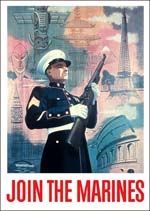
He was a victim of the intoxicating Marine posters and the ever so slick recruiter who swam into his life like a hungry shark, and left with a 17-year old youth in its teeth. It's a story that has been taking place and continues to happen in this nation every day.
And while this story is far more about real life challenges than politics, do think of Ed Freed's story when you consider the Bush administration's decision to allow recruiters into schools for the first time in history. Remember that the recruiter's prey don't all land on their feet, or return from the places this country will ship them.
To describe Ed's ultimate story as amazing is a little like calling Moses old. From aspiring teen hero to a raging trouble bound Marine 'shit bird, through combat and a night in a foxhole when he discovered God. This man who 'found his way' and has now spent three decades in clergy dedicated to his creator, his fellow human beings, and peace.
He learned that the hardest battles aren't necessarily fought against the Viet Cong, or the Marine superiors he and his friends would have just as well shot dead; his biggest challenge was far more unique and unexpected.
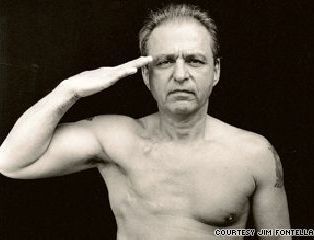 This photo of Marine Corps Veteran Jim Fontella |
Dirty Water
Ed was stationed at Camp Lejeune from the end of 1962 until the beginning of 1965. These were the years when people drank the water freely with no reason to suspect it was like drinking a concentrated level of poison.
It would take decades before began to learn the truth about the North Carolina Marine Corps base's deadly toxic water and we'll never really know how many lives were lost during these 'dark years'.
They passed long before the cause of cancer in so many people, from Marines to family members to base employees to their children through hereditary qualities of the chemicals, based on the absorption and ingestion of the chemicals, would be 'outed'.
A sizable number of current and former Marines received a letter several years ago advising them of the potential health hazards connected to the base. Then last year, the Marine Corps, Dept. of the Navy and Dept. of Defense, assembled a panel of scientists who issued a letter saying all evidence concluding the base water was dangerous, was 'inconclusive'.
They tried to throw everyone back to square one. But in the end, due to the acts of elected officials and the Agency for Toxic Substances and Disease Registry (ASTDR), the bogus report from the National Research Council (NRC) scientists was rejected. There is a lot to know about Camp Lejeune, so first let's review two of the tireless activists in this regard: Jerry Ensminger and Mike Partain.
The Few, The Proud, The Forgotten
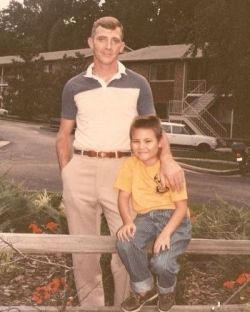 Jerry and Janey Ensminger |
When I first read Jerry Ensminger's story I was blown away; the saga centers around his daughter Janey and the cancer she battled and eventually lost. Jerry lost his daughter Janey in 1985 when she was just 9-years old. Years after she passed, he learned about Camp Lejeune's water toxicity, and became a force against the Marine Corp's denial of responsibility.
Records show that people at Camp Lejeune drank contaminated water between the mid-1950s and 1987.
The contaminants are linked to spills, old storage tanks located underground, and poor disposal practices of a now-closed dry cleaning facility located off base, but close enough to be a major contributor to the problems there, so the Marine Corps said.
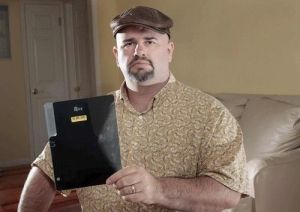 Mike Partain |
An associate of Ensminger's; breast cancer Survivor Mike Partain, was quoted by The AP when the male breast cancer matter first came to light saying, "This male breast cancer cluster is a smoking gun,"
"You just can't ignore it. You don't need science to tell you something is wrong. It's common sense. It begs to be studied." A resident of Tallahassee, Florida, Mike Partain was born at Camp Lejeune. His breast cancer diagnosis happened in 2007. Mike represents the family side of this issue; one didn't have to be a Marine at Camp Lejeune to get sick, they only needed to live there.
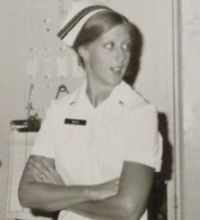 Nancy (Neale) Brown |
And still there are other faces to the breast cancer case history of Camp Lejeune.
Nancy (Neale) Brown was a nurse in the US Navy during the 1970's at Camp Lejeune. Nancy lived in the barracks next to the Naval Hospital on Hadnot Point; Camp Lejeune's most notorious 'hot spot' revealed as a location with alarming levels of benzene contamination.
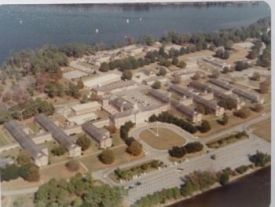 Hadnot Point circa 1970 Photo: Nancy Brown |
Nancy learned of the benzene found in the water and this led to a Google search to see if there was a direct medical connection.
"The results alerted me to numerous experimental studies showing a direct relationship between benzene and breast cancer in rats. There were also stories about clusters of woman who developed breast cancer after being exposed to benzene in various settings," Nancy said.
Nancy Brown, Ed Freed, a former Marine named John Hartung, former base residents Carol Davis, Candyce, Terry Dyer and several others are and continue to be extremely helpful, but it is Mike and Jerry who are testifying in front of committees and holding meetings and staying in front of the press and that is so important.
On behalf of all, we appreciate the long and hard hours they all invest in helping others.
Improving Conditions in VA
Today there is actual recognition from the government of Camp Lejeune's health hazards, though getting the VA to assist Ed Freed was no possibility. Last December Marine Corps Camp Lejeune veterans and their families potentially affected by the contaminated water did receive good news; something they have waited a long time for. It is the government's acknowledgment of the reality of years of often deadly health nightmares. Claims are being approved, steadily, and each new approval further establishes the reality of Camp Lejeune's deadly cancer-causing water.
View Larger Map Camp Lejeune's 'hot zone' Hadnot Point |
It seems like one sometimes, but it isn't a blame game, this story is about health and responsibility to people who served their country.
Ed Freed saw combat in Vietnam along with so many others; now the generations of Iraq and Afghanistan Marines and everyone in between is in the mix, plus the fact that the problem well pre-dates Vietnam.
Growing public awareness of the danger of the North Carolina base's water and the Marine Corps' having been caught falsifying reports of Benzene levels connected to the Hadnot Point fuel storage area, led to even more questions from public officials and more media attention. The claims have slowly been increasing in tempo.
Succumbing to pressure from media and politicians in North Carolina, the Defense Department is being forced, slowly but surely, to take responsibility that they have tried for years to avoid. In the past, the reluctant Marine Corps and the Dept. of the Navy acknowledged that there were health affecting issues relating to water on the base, but they blamed it exclusively on PCE (perchloroethylene) from an off-base dry cleaner.
Then, the part that really hurt and stood to set the progress back to zero. The DoD put together a panel of scientists who shocked Marine families by announcing that all previous research connecting Camp Lejeune's water to the various illnesses was suddenly null and void, and that no solid evidence actually linked the growing number of illnesses to the base's water.
As time passed, the Benzene lies surfaced, thanks to The Associated Press; the NRC (National Research Council) findings were demonstrated to be without merit, and any hope the Corps had of being able to maintain the lie vanished like think air. In a previous article I referred to this process as "transparency induction" and I'd like to see more of it in my lifetime.

The Department of Veterans Affairs in December, began training a specialized cadre of workers to handle the increasing number of disability claims related to Camp Lejeune.
That is a good move on their part, and more people in Ed Freed's shoes will find their way through a system in the future that kept its doors closed to him.
By the way, for those Camp Lejeune Veterans reading this article, the claims will be consolidated at one office in Louisville, Kentucky. where 8 employees will focus on the contaminated water-related claims.
I always feel the need to mention that our primary focus at Salem-News.com since the summer of 2008 has actually been on the contamination of the Marine Corps Air Station El Toro in Irvine, California. El Toro, an EPA 'Superfund Site', is now closed and it was slated to be redeveloped into a housing community and a park for Orange County.
Amazingly, the park aspect is still technically in the planning and development stages, even though over $200 million in dedicated taxpayer funds have mysteriously disappeared.
Sadly, even meager gestures from the VA for Camp Lejeune veterans mean nothing for El Toro veterans. Those of us who served there strongly resent this. For this reason Salem-News.com writer Robert O'Dowd along with myself and other Marine Veteran writers on our staff like David Bedworth, consistently try to raise the awareness level by generating reports on this very serious subject.
Male Breast Cancer
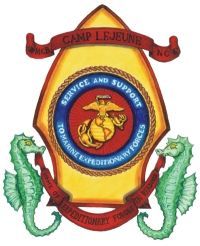
We reported in July 2009 that 17 Camp Lejeune male Marines and civilians had been stricken with breast cancer. In July 2009, a surgery revealed that Ed Freed had cancer.
He explained, "The Lebanon VA Hospital who did the first second and third surgeries said it was male breast cancer but could not make a positive identification so they sent specimens of the cancer to the Air Force Institute Of Pathology,(AFIP). Seven weeks later the AFIP finally reported back to the Lebanon VA and stated they didn't believe the cancer tissues sent to them were male breast cancer but a type of cancer called Aprocrin cancer. Like the Lebanon VA Hospital, the AFIP also could not make a positive identification of the cancer. If the second diagnosis from the AFIP is correct, I would have been the 39th person in the world to have this rare type of cancer."
I'd say Ed is in the top one percent, in the opinions of many, but to be the 70th male survivor and possibly the 39th person with Aprocrin cancer are historic, dubious and noteworthy attributes.
The decision was made to treat Ed for male breast cancer. The medical teams treating this former Marine stated to him repeatedly they have no idea at all on how to treat Aprocrin cancer. Challenges were raised and options were reduced by the knowledge that all 38 people before Ed with this rare Aprocrin cancer have all died.
"I am now in remission which can only mean one of two possibilities. If I had Aprocin cancer, the VA Hospital has just stumbled on a cure for a very rare cancer and this should be a news worthy event. I think this is very unlikely. The most likely scenario is, the cancer I had was male breast cancer and that is why I responded in a positive manor when treated as though I had breast cancer."
Veterans with challenging healthcare issues have an endless set of hoops to jump through and our Writer, Dr. Phil Leveque, who is a survivor of combat in WWII often states, "The VA's mantra is 'deny deny until they die' and there is no question about it. That is their record. It needs to change."
The strangest thing took place as I was working with Ed and gathering information to write this article. I had asked him to elaborate on his time in the Marine Corps. I was curious as to whether or not he had been deployed to Vietnam, how long he was in, etc. At the same time that I asked this, I was writing an article about my own time in the Marines when I was charged with having led a Mutiny. (I know, it isn't quite as insane as it sounds; a link to this piece can be found below with the other links)
This led to my explanation of the term 'shit bird' which is Marine Corps jargon for those who fail to take on the 'spit and shine' mentality. Little did I know that this word was being written by Ed as he recounted his time in the Corps. I really took pause over that. I think I've gone periods of five years since those days without saying the word a single time.
But then maybe I'm exaggerating, after all I'm with Salem-News.com, where a dozen or so writers comprising our team of over 80 individuals, are Marine Corps Veterans. I can't exactly explain it, but they are some of our best writers I've ever worked with, gutsy and very intelligent, much in contrast with the typical 'knuckle dragger Marine' image that comes to mind for plenty of people. The other thing about Marine Veteran writers is that when they write, they do it from a perspective of having 'been there' and having 'done that'. That said, I still don't know how many pushed the limits as much as Ed did. His entry into the Marines and the extreme nature of his experience was full tilt to say the least.
Marines shoot calendar for male breast cancer research (artbecause.org) |
Our Advocacy
I'm honored that Ed wrote to me explaining his tedious and painful journey, and that Salem-News.com's articles about Camp Lejeune are being found by people exactly like Ed.
He said, "Until now, I felt like I was on my own in this battle. I filed a claim with the VA trying to link this cancer to my Agent Orange exposure in Viet Nam and it was rejected. A family member then sent me an article about the Camp LeJeune water."
Ed says he then gleaned over 60 pages of information pertaining to the Agent Orange along with the chemicals in the Lejeune water and appealed that rejection almost a year ago.
He continued, "About a month ago I stopped by the VA to check on the status of the appeal. I was informed that they haven't even looked at it yet and if this appeal in any way has anything to do with the Lejeune water, my case when they got to it would be forwarded to another location that is going to handle all the Lejeune water cases. That's when I again started to search the internet and came across your articles."
Score two for the team.
We can't prevent cancer but we can provide a great deal of valuable information through our archives which are always free and available. Scarcely a day passes without a new veteran writing, asking for answers, guidance, etc. There are many hurdles as one would expect, but there are also shortcuts and that is why the conveyance of this information is beyond important.
Those reading this can write to me anytime and the address is below. If I fail to write back it simply means I missed your email, please write again. We have Dr. Phil Leveque available to answer questions, which is especially valuable as he testified as a Forensic Toxicologist in the first court case against Dow Chemical over TCE (trichloroethylene) which is a chemical contaminant at Camp Lejeune. Dow lost that case by the way, TCE in that event led to the death of a janitor who used it to clean floors, with no idea how toxic it was.
Recruiter Persistence
Ed Freed was 17-years old and a senior in High School walking home from a store when he passed the Post Office and saw the big poster in front with a Marine in his Dress Blues. He recalls the caption at the bottom of the poster reading, 'The Marine Corps Builds Men.'
"I was six feet two inches tall and weighed a whopping 165 pounds. There were a couple of guys in school who I didn't like and were making life very difficult for me. When I saw that poster, I stopped and mentally put myself in those dress blues and the caption at the bottom of the poster grabbed both my mind and heart. As I stood there gazing at that poster, I thought YEA!!, that's what I want to be, I want to be a man, just like this Marine in the poster. My idea of a man at that point was a person who could stand noise to noise and toe to toe with anyone while spitting in their face and daring them to do something about it. I had formed this mental image of me in those dress blues doing just that and kicking the butts of those guys in school I didn't get along with."
Ed says he stopped, went inside the Post Office and told the Marine recruiter that he wanted to become a man just like the guy in the poster and join the Marine Corps.
"After talking with me and gathering some information, the recruiter informed me that I had a problem as I was only 17-years old and could not join unless I had my Mothers approval. I knew right away that this was going to be extremely difficult if not impossible. My father had passed away several years ago and my Mother who had 7 kids had become over protective of us. At times it seemed like if any one of us kids would have injured ourselves taking a bath, we would have never been permitted to take a bath again."
Nonetheless, Ed went home and told my Mother that he wanted to join the Marine Corps.
"You would have thought a bomb exploded in the house. No son of hers was ever going to join the Marine Corps. Days later I finally gave up the fight and sadly informed the recruiter that my Mom would not let me join the Marine Corps. That's when I found out that Marines never quit."
"Why don't you let me talk to your Mother? I think I might be able to get her approval and have her sign your papers". Ed remembers the Marine recruiter saying.
"I thought, he doesn't know my Mom. When I agreed to leave him give it a try, he told me that when he came to my house that night, I was to get out of the room so he could talk to her alone. He said that if I heard him say anything that I didn't agree with, I was to remain silent and stay out of the room until he was finished, otherwise his attempt might fail."
The recruiter came to Ed's house that night and he went into another room as agreed, but not out of ear shot.
"I wanted to hear this miracle he was going to perform take place. He then said to my Mother, 'Mrs. Freed, this boy of yours is being a pain in my butt and probably yours to. He stops by my office every day telling me he wants to be a Marine. When I look at him, all I can think is that this tall skinny kid could never pass a Marine Corps physical. He just doesn't have what it takes to be a Marine and I am getting nowhere with him. I just can't get him to understand that'. He then said, 'Mrs. Freed, if we team up and work together, we can put an end to this. He will stop coming by my office and at the same time we will get him off both our backs and finally we will have peace of mind'. I was tempted to run into that room and ask him what he was doing. He was supposed to be helping me get into the Marine Corps not hammering nails into my coffin, but I promised him I would stay out of the room and not say anything. Then he continued, 'Mrs. Freed, you do know that when he turns 18 in October, the law mandates that he has to sign up for the draft?' That was true back then; every male at the age of 18 had to by law, sign up for the draft."
Ed's mother told the recruiter that she knew that. He then continued, "The reason for signing up for the draft is for our national security, so in case we should ever again have to go to war, our government will have a complete list of names and addresses of all the men in our nation who are old enough to serve in our armed forces."
He told Ed's mom that the system has a flaw.
"There was no way for the government with this list of names to know if all those men were physically fit to serve in the military. A good many of those men on that list are probably like your son. They may have as honest desire to serve, but they are not physically up to the task of being in the military," the recruiter said.
He told Ed's mother that has now changes under a new law that just passed requires that everyone who now signs up for the draft, must also take a draft physical.
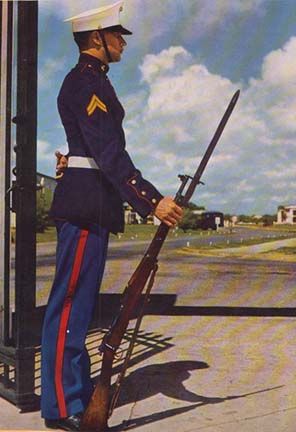
"Now the government will now know how many of these men who have signed up for the draft are physically fit to serve. Here now is what we can do to get you son off both our backs. With your permission Mrs. Freed, I can arrange in the next few days for your son to take the required draft physical, not the Marine Corps physical which is a lot harder to pass."
The Marine recruiter told Ed's mother that unless her son suddenly became more physically fit and puts on a lot more weight, he will never pass the basic draft physical, and if he can't pass the basic draft physical, he will never pass the much harder Marine Corps physical.
"When he fails the basic draft physical, you and I will finally have peace of mind", the Marine told Mrs. Freed.
Ed says that was the baited trap. In reality there never was a law that required a person just signing up for the draft to take a physical and there was no separate Marine Corps physical that was different from the other Armed Forces physical. A physical was only required if and when a person received a draft notice and that didn't happen until a person was 22 or 23 years old.
"This sounded like a great idea to my Mother", Ed said.
"She thought the papers he handed her to sign were for me to take a basic physical for the draft which I had to sign up for at the age of 18. She had no idea she had just been tricked into signing my enlistment papers."
April 3rd 1962, on Ed's Mothers birthday, Ed took his physical and passed, as the recruiter had anticipated.
"I was then sworn in and I wanted to quit school right then and there and leave for boot camp. The recruiter however insisted that it was important for me to finish High School first. I left home for Paris Island in July of 1962 after having graduated from High School. For me, the 12 weeks from April 3rd until July was an eternity. I didn't think that day in July would ever get here."
Dose of Reality- Pair of Yellow Footprints
Like virtually every other Marine in history, Ed says he will never forget the day he arrived at Paris Island. He says it only took about 10 minutes before he started mumbling to himself, OH SHIT!! because you didn't dare mumble anything out loud.
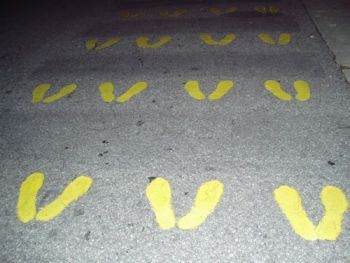 Courtesy: One Marine's View |
Ed says the actual words were, "OH SHIT!! WHAT DID I GET MYSELF INTO?" He remembers hitting the rack that first night at attention as everyone else did, and not one of the new recruits moved a muscle that night. Ed says his DI had screamed as the lights went out, "All right you Sallies, I better not hear so much as one of you screws taking a breath tonight," and all 75 men in the platoon would have died holding their breath.
"In the morning at 0430 I was sound asleep, still at attention when all 3 DI's came in and woke us up by throwing empty 55 gallon trash cans onto the floor, and then banging on the lids and empty cans with a big stick while screaming as loud as they could, GET UP!! GET UP!! GET UP!! We had exactly 3 minutes to get out of bed, get dressed and be outside in formation standing at attention and ready for our first morning run. To think, I couldn't wait for this day to come. Welcome to Marine Corps Boot Camp."
This part of Ed's story is featured is many films and of course typified by roles played by Lee Ermey who in fact was a Marine Corps Drill Instructor and like Ed, a Vietnam Veteran. After thirteen weeks of boot camp in which the recruits were not allowed to talk to anyone, and then six weeks of Advanced Infantry Training, he and the other new Marines were finally given their job assignments, known in officially as a military occupational specialty, or MOS.
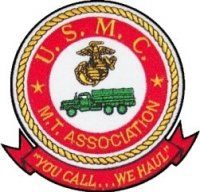
When Ed joined the Marine Corps, the enlistees were not allowed a role in selecting their occupations; instead the military occupational specialty (MOS) was assigned to each Marine. Ed remembers feeling disappointed upon learning that his MOS was 3500, a truck driver. As important as the role is, the job didn't match his hopes and expectations.
"The reason I joined the Marine Corps was I wanted to learn how to fight and be a man and in my mind, that didn't happen yet and it wouldn't happen as a 3500."
The end of 1962 Ed Freed reported to Camp Lejeune 2nd Tank Battalion, Motor Transport. The first thing his new command did was change his MOS to 3516, mechanic. For this role he was sent to school.
"I finished Mechanics School and by now I was an immature 18-year old Marine PFC with an attitude who had a knack for gravitating towards trouble."
Danger Zone
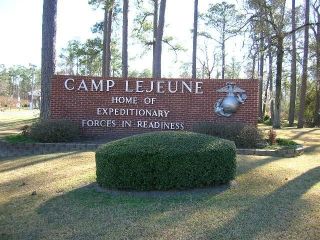
Round one came one night in Motor Transport. Ed explains that Marines assigned guard duty had to remain at the motor pool all night with a dispatcher and being ready to pick up the Officer Of The Day, (OD), whenever he called and needed to be driven around to check and inspect all those who were on guard duty that night.
This was Ed's first guard duty at Camp Lejeune and the dispatcher on duty had brought a couple six packs of beer with him to pass away the night. The dispatcher offered Ed a beer but he knew that he would be driving the OD around the post, and was afraid the OD would smell the beer on his breath, so Ed declined the offer to have a drink.
He said, "Around 0200 the OD without a call showed up unexpectedly at the motor pool to inspect us and caught the dispatcher with a beer in his hand and a waist can full of empties. Both of us, the dispatcher and me were then relieved of our duty and I had my first Office Hours. I was busted to a Private and put on 30 days restriction. I was told that it was my duty to report the dispatcher that night, not to stay on duty with him. Welcome to Camp Lejeune."
The term 'office hours' is Marine Corps slang for non-judicial punishment, (NJP) which involves a Marine being charged and sentenced by his or her commanding officer for the offense, rather than opting for a summary court martial, which is an option with a heavier penalty for the guilty.
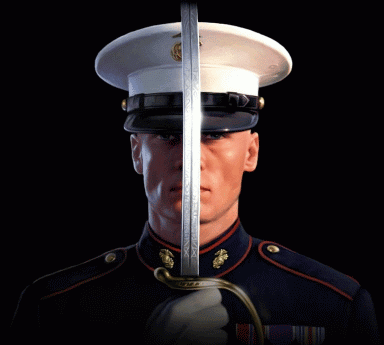
And Marines are guilty of course, the vast majority of the time. There are after all three ways to do things: the right way, the wrong way, and the Marine Corps way.
Ed would eventually get his PFC stripe back and by then, he remembers how he could get plastered on 2 beers.
"One night I ventured into Jacksonville on liberty and pushed my drinking limit to 3 beers. It was then that I spotted the OD, not the same one who got me busted, but with 3 beers in me, I just didn't care. Drunk as I could be on 3 beers, I took a swing at the OD and immediately was overcome by 4 MP's who were accompanying him. That's when my drunken mouth took over and I began to make all kinds of terroristic threats. They let me out of the brig in the morning after I sobered up with one charge for hitting an officer and about 30 charges for all the 'terroristic' threats I had made."
The Marine Corps considered giving Ed a court martial for hitting the officer but decided that office hours would do. He was busted to a Private again and given 60 days of restriction.
"So my Marine Corps career went. While most other Marines at that time were achieving the rank of E5 or E6 in 4 years, the highest rank I ever had in 4 years and 4 months of service was the rank of E3, Lance Corporal."
Welcome to the club Ed, there are so many of us who never passed 'lance cooley' in the Marine Corps that you could never count us all.
Sanity by Intoxication
Ed says in the beginning of 1965 his command decided it was time to make him someone else's problem and he was issued orders to go to Okinawa. On his very first night on Okinawa, Ed was introduced to homemade Okinawa Saki and Sloe Gin mixed into a big kettle with whatever kind of alcoholic beverage anyone in the barracks wanted to put in it.
"They called it a MO JOE party", Ed said.
"This party was the party they claimed was always celebrated when someone new came aboard. That someone new was me. I don't remember anything after the first hour of the party. All I know is in the morning when I awoke, I was covered with lumps, bumps and black and blue marks. It took me most of that day to sober up."
He says that night, the so called, 'Cool Marines', not the spit and shine guys, took him under their wings and explained to Ed how to beat the system on Okinawa.
"All Marines on Okinawa had Cinderella Liberty which means we had to be back on base by midnight. If you went on liberty you had to check out your liberty card. A liberty card wasn't required to get off base as no one ever checked for a card as you left the base. However no one gets back on base without a liberty card."
Every night sentries were posted all around the high fence that surrounded the entire base, Ed says. In the morning at 0600 all the sentries were removed from the fence around the base and it was left unguarded until the following night.
"Now if I wanted to party with the really Cool Marines, I was not to check out my liberty card and that would enable me to stay out all night as no one would know I was off base because my liberty card was there in the box. Then in the morning we would all return around 0630 after the sentries were removed from the fence and crawl over or under the fence."
Ed recognized at this point that he had a distinct knack for gravitating towards trouble. During his first month on Okinawa, he recalls being off base every night with the really Cool Marines and every morning they would crawl over and under the fence.
He remembers that at this point, things were agreeable.
"Life was good, I thought. I was planning on being a party animal for the whole 13 months on Okinawa. When I finally did return to State Side, I would have less then 90 days on my enlistment and that would get me an early discharge. Life couldn't get any better then this. Little did I know that the Marine Corps had other plans which included 1 year in South Vietnam and an involuntary extension on the time I had to serve."
Off to Vietnam
The Marine Corps build up in Vietnam was ordered in March of 1965 and the unit Ed was assigned to on Okinawa seems to have viewed this as the perfect opportunity to clean house of all it's really Cool Marines.
"I along with the other really Cool Marines were transferred to the Marine Combat units that were already on ship waiting to land. I heard one of the spit and shine Marines say to another as we were departing, 'that's what happens when you choose to be a shit bird in the Corps, they get rid of you.' Three months later, I had the last laugh when all these spit and shine Marines joined me in South Vietnam."
Combat pay was not automatic in the early days of Vietnam, it had to be earned. In order to earn combat pay, a Marine had to be in what then was considered a combat zone, a certain amount of days each month. This had to be verified for every Marine by the officers in charge of their units. Ed and the Marines in his unit were not Grunts, (infantry troops), they were support personnel for the Grunts.
"To earn my Combat Pay, I would volunteer to ride shotgun whenever I could as our trucks moved supplies and equipment into these combat areas. Later when all of Vietnam was classified as a combat zone and everyone there received combat pay, I continued to volunteer to ride shotgun whenever we moved supplies and equipment into an actual combat zone where all the Grunts were. I didn't want anyone to know that I was afraid."
Trained to Kill
Ed says when he was sent to Vietnam, he suddenly had two wars to fight. One was with the VC and the other was a continuation of a prolonged battle that started back in Lejeune with the officers and non commissioned officers who disliked Ed and his friends. Ed found himself in the thick of both wars.
But he really wasn't alone on that one. While a good deal can be said about Marines like Ed and myself who found ourselves in the 'shit bird' category during our time in service, there is another side to the coin. There are far more non-rate Marines (E-3 and below) than there are officers and non-commissioned officers (NCO's) in the Corps. My recent story about leading a Mutiny as a Marine was centered around a response to ridiculous abuse from NCO's. I only ducked the charges by threatening to go to the media.
My trouble as a Marine happened during peacetime, when the Corps has plenty of time to think of ways to creatively punish Marine shit birds. This was no such option in dealing with a senior or 'Staff NCO' who was in charge of Ed and his fellow Marines in Vietnam. Nope, no such niceties in a combat theater where men are losing their lives. Ed says a gunnery sergeant learned a lesson about abuse one night when their airfield came under mortar fire, that he probably never forgot.
"We had a Gunny Sergeant who insisted his job was to make life miserable for the troops and that's as polite as I can be with his description."
Ed recalls that when the mortar rounds started coming in, planes were blowing up and fires were sending flames 40 feet in the air everywhere. They were dug in on the perimeter of the air field waiting for a full scale assault to take place when the motor rounds stopped coming in.
"The word that night was quickly passed from fox hole to fox hole, When the assault starts and the first small arms are fired, its two cases of Johnny Walker Black and White Scotch to the person who takes the Gunny out. Suddenly the entire front line on the perimeter were more interested in where the Gunny was then who might attempt to breach our defense."
Fortunately for one unpopular gunnery sergeant, that assault with small arms never came and the following morning, the gunny left the unit before the sun came up and refused to come back to his assignment.
Ed said, "I think it would be safe to say that he found a few rifles that night pointing in his direction. The Scotch you may inquire, where did that come from? Lets just say one of the ships we helped to unload with our trucks had all kinds of booze and cigarettes ear marked for delivery to an officers club on the air base. To the best of my knowledge, the officers club for some reason were expecting a lot more product than they received."
This Marine Combat Vet believes one of the biggest lessons Vietnam taught him was that he wasn't as brave as he let on to be.
"I was scared to death that I was going to die over there. This really hit home after we experienced the VC mortaring and blowing up those planes on the South end of the air field. This wasn't one of those glory movies you watch on TV, this was the real thing. Marines here were being killed every day and I didn't want to be one of them.
He says the key point he missed, was that everyone else was just as terrified of dying as he was; they just had different ways of coping with fear and this is where their training came through.
"We could not and would not let fear interfere with our duty of being a Marine." It's a little like a disease, but the Marines are always awesome about stepping up to the plate. The Corps is always a mixed bag. When I was covering the war in Iraq in 2008, I had Marines tell me that the real motto of the Marines isn't Semper Fi for 'Always Faithful', it is Semper Gumby for always flexible and I agree that.
The Painkiller Alcohol
Ed increasingly discovered that alcohol helped deal with the fear, though he knew even then that alcohol doesn't give a person courage, it just deadens the senses.
He eventually got to the point where his hands would tremble and one eye would twitch. A very young man to be facing such a thing, Ed don't know if this was from the booze, the fear or both. What he did know was that after a few drinks everything would calm down and he was OK again for a while.
"I heard it said that a person in my condition has to hit bottom before they can pick themselves up. I think I hit bottom around Christmas Eve, 1965".
That was the night intelligence had reported that a massive offensive by the VC was imminent and we were put on full alert.
A Page Turns
"There I was on Christmas Eve sitting in a fox hole with a rifle in my hand overlooking a rice paddy waiting for the enemy to come charging out of the jungle on the other side of the rice paddy, attempting to cross. That enemy attack never did materialize but something else happened that night which has forever changed my life. At that time, I didn't believe there was such a thing as God and if by chance I was wrong, I most certainly didn't want to have anything with a God who could allow the hell we were going through in a place called Vietnam."
It just so happened that the Marine in the fox hole with him that night was a strong believer in this God thing and that's how he coped with his fear.
"We talked all night long and he constantly kept bringing up this God issue. I would give him my best arguments of why there couldn't be a God, there wasn't very many of them, and he would counter my argument with reasons to prove there was a God. In the morning when we parted company, I didn't think his words had any effect on who I was or what I believed in, but throughout that day and the next I found myself for perhaps the first time in my life taking a deep hard look at who I was and what I had become."
Ed remembers seeing in himself, something he did not like. It was then that he began to realize that this image of a man that formed when he was 17-years old, standing outside the Post Office staring at a poster of a Marine in Dress Blues... was all wrong.
"I knew that because I just spent Christmas Eve in a fox hole with a REAL MAN. A REAL MAN had what I now refer to as HIM. The letters in HIM stand for Honor, Integrity and Moral Character. At that time, I had none of this, but the next day which was Christmas, I took my first step into becoming a REAL MAN."
It certainly is interesting what leads a man to take the steps that he takes, or to meet the people that he meets. Some call it divine intervention, where others simply would call it good luck. Ed has taken the deeper route and believes everything is connected to his faith, and the faith of others around him.
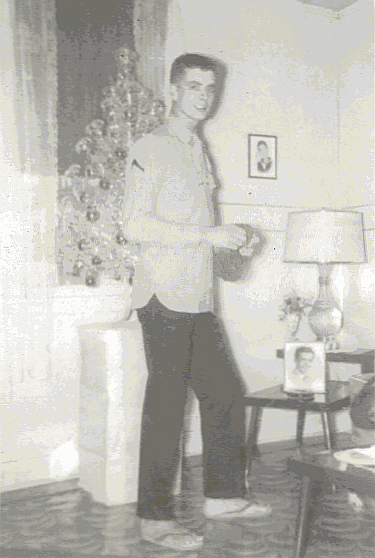 In partial uniform, early 1960's when Ed was home on leave. |
Because of the rareness of this cancer, Ed's case was presented to a Cancer Tumor Board which consisted of doctors all around the world who would meet weekly via the Internet to discuss rare cancers in hopes of coming up with a treatment plan that might work.
Ed remembers his heart falling at the first suggestion of this board; to amputate his entire left arm and shoulder as the only possible hope of getting rid of this cancer.
"I immediately told them I had a quicker cure. I told them all they had to do was to put a tourniquet around my neck and get it real tight for about five minuets and the cancer would be gone. They then gave me one of those say what? kind of looks, to which I explained to them in plain English, You are not getting my arm and shoulder".
The Cancer Boards other suggested trial method of treatment was mega doses of the chemo used for breast cancer, followed up with mega doses of radiation. This was after a surgery in which they removed 80 percent of a tumor from under Ed's arm and side of his chest wall that was bigger then a grapefruit.
"They made it a point to tell me every step of the way that everything they were doing was a guess and they had no idea how any of this would turn out."
Ed's story is a nightmare not betrayed in the pleasant photo of him accompanying this article. His initial chemotherapy sessions lasted eight and a half hours and he learned how toxic a tiny drop of the stuff was when a nurse accidentally got a drop of it on her sleeve as she was changing the bags.
"She had to leave the floor, shower for half an hour, put her clothes in a sealed bag which were then sent to a special facility where they would be washed three different times before they would be returned to her. I thought wow!! To think they are pumping bags of this stuff, all day long into me."
After the first week Ed lost every hair on his body. He says the miserable side of the experience quickly excelled to where it felt like someone clubbed every square inch of his body with a baseball bat.
"This was then be followed by my breaking out with painful boils and pimples everywhere. When all the pain, boils and pimples finally subsided, it was time for my next chemo treatment and everything started all over again. This lasted three months and I tried my hardest not to leave anyone know I was suffering."
Then Ed was off to Philadelphia where twice a day for 7 weeks they burned half the left side of his chest and side with radiation until it turned a charred black, damaging half of one of his lungs.
"A second surgery was then done to remove the other 20 percent of the tumor they could not get with the first surgery. Because this surgery was done in an area that was burned so bad with radiation, the sutures they used would not hold and I ripped wide open and was left with a hole under my arm 4 inches wide, 5 inches deep that took almost 6 months to close and heal. At this point they declared me cancer free and were feeling they had discovered a cure for this rare cancer."
But then after a few months, a cat scan and a PET scan revealed they had not gotten rid of the cancer, it was back.
An Indisputable Miracle
"The week of Christmas this year, I was scheduled for my third cancer surgery. I was preaching the Sunday before my surgery and asked all the parishioners at all three of the Masses to pray for me."
They responded by asking Ed's pastor to anoint him with the Sacrament of the Sick which he did at the end of the last Mass."
Ed said, "Later that week before the surgery, Bishop Barres called me at my home and told me he was in Baltimore with other clergy and he was offering up his Mass that day for my total and complete healing. I also had people from three other parishes I was assigned to over my 32 plus years praying for me as well as other Christian Churches in the area I now live in."
The third surgery was performed by the head of the Cancer Tumor Board. The lab tech they always have present when doing these surgeries examined the removed cancer tissue and the decision was then made by the Tumor Board to divide the cancer cells into 5 different segments.
These five samples were sent to 5 different labs in hopes that one of them with their different talents would be able to give them a hint as to what the next guess should be in their attempt to treat this cancer.
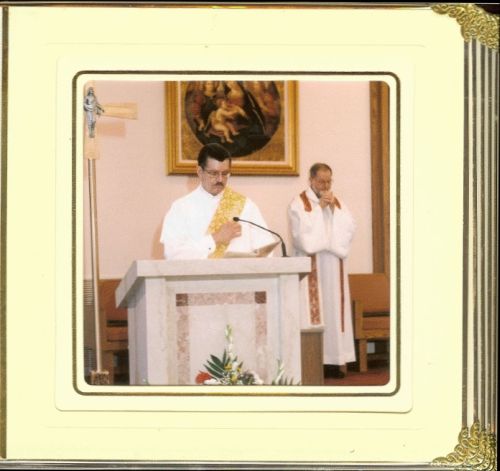 Ed leading his congregation prior to developing breast cancer |
Ed recalls that the Tumor Board was stunned when all 5 labs reported back in a very short time that they could not find any signs of cancer in any of the tissue sent to them.
This Marine turned Clergyman then had an examination and meeting with the head of this renowned Cancer Board who said:
"Mr. Freed, not only don't we know how to treat this rare cancer you have but we also have no idea at all how to follow you up".
With regard to the cancer suddenly having disappeared, she said the things that were taking place with regard to Ed's cancer are "illogical". Ed knew that there was no explanation that would meet a scientific test, so he explained to the physician what he believed had taken place.
"My wife and I then explained to her that what she doesn't understand is the power of prayer. I had all these people from so many different Churches praying for me and what she has here is one of God's miracles."
Ed says she responded by saying, "I believe in prayer". He believes she was about to say more, then chose to be silent.
"I think her reaction was going to be, 'I never in all my medical experience have seen cancer vanish from the operating table to the lab.' I am now declared to be in remission and I believe with all my heart that the prayers of all these people is the reason for my cure."
Ed's success at beating cancer seems to largely hinge around his level of acceptance. That quality from his Marine Corps days, when you have to hold your head up and move forward regardless of all else, kicked in and allowed him to find that last bit of strength.
"My view on this was there were only two outcomes possible for my cancer. One is I was going to beat it, in which case this would be great for me and my family. The second outcome is that cancer would win out and while not good for my family, it would be great for me because then I would spend all eternity praising our Lord with Heaven's Angels and all the Saints that have gone before me. I had here a win, win, and I couldn't loose. I wasn't the slightest bit concerned about the outcome of this cancer. It was all in God's hands and I was OK with whatever He decided."
Ed added, "Never underestimate the power of prayer. I contribute my healing to the power of so many people praying for me, just like they will now pray for you if you but ask."
I told my son Sean while wrapping up this article, that it would be very interesting to map out a few cases that are similar to Ed's; where people survived incredible odds, after being told their conditions were absolutely fatal, but bounced back, otherwise inexplicably, from death's door. The obvious common theme is prayer and while I am a person who believes in God, it humbles me to think that we are discussing the literal power; scientifically measurable evidence of God's healing gift that I would like to think, is given to all people.Do these miracles take place in every culture?
Are they unique to any particular type of illness?
Are they unique to any particular religion or religions?
Ed Freed had an obvious mission in life and by the looks of things, that will continue for some time. Please don't judge him for his Marine Corps antics because that life is one heck of a thing to have undertaken at such a young age. I suspect we all go down particular roads that we should avoid, but it is the outcome that matters most.
Important sites about Camp Lejeune:
Mar-28-2011: Confessions of a Marine Corps Mutineer - Tim King Salem-New.com
Articles Relating to Breast Cancer at Camp Lejeune:
- Jan-25-2011: Former Colonel Sues Marine Corps Over Camp Lejeune Water Contamination - Barbara Barrett Special to Salem-News.com
- Jan-20-2011: VA Boosts Process for Camp Lejeune Toxic Water Claims - Tim King Salem-News.com
- Oct-13-2010: 'Camp Lejeune A Hearing - 'David Bedworth Salem-News.com
- Sept-19-2010: Camp Lejeune is Amerika's Kursk - Tim King Salem-News.com
- Aug-09-2010: Camp Lejeune's Sickness and Unexpected Déjà Vu - Dave Bedworth Salem-News.com
- Jun-21-2010 VA Quietly Giving Benefits to Marines Exposed to Toxic Water - By Barbara Barrett Special to Salem-News.com
- May-09-2010 Ugly Truth About the American Cancer Society - Tim King Salem-News.com
- Apr-08-2010: Veterans Input Needed on Environmental Breast Cancer Study - Robert O'Dowd Salem-News.com
- Feb-21-2010: Pressure Building Over Excessive Benzene Contamination at Camp Lejeune Marine Base - Tim King Salem-News.com
- Dec-14-2009 Lejeune and El Toro: 'A Tale of Two Bases' - Robert O'Dowd Salem-News.com
- Nov-06-2009: Report Clearing Marine Corps Connection to Camp Lejeune Sickness was Purchased - Tim King Salem-News.com
- Sept-26-2009: Marines with Breast Cancer: the Terrible Toxic Legacy of Camp Lejeune and Trichloroethylene - Dr, Phil Leveque Salem-News.com
- Sept-25-2009: Lejeune Breast Cancer Victims Not Supported by Corps - Robert O'Dowd Salem-News.com
- Sept-25-2009: The Few, The Proud, The Damaged - Tim King Salem-News.com
- Jul-09-2009: 17 Male Breast Cancer Victims Have Ties to Camp Lejeune Marine Base - Salem-News.com Staff
- Sept-17-2009: Male Breast Cancer: a Hard Bullet to Dodge for Marines at Camp Lejeune - Tim King Salem-News.com
More Background on Camp Lejeune:
- May-28-2010: Congress pushes military to release data on Camp Lejeune water - Barbara Barrett McClatchy Newspapers
- June 17, 2009: Burr Presses on Camp Lejeune Water Contamination at Hearing - Salem-News.com
- June 16, 2009: Hagan Jumps in the Ring for Marines - Salem-News.com
- Jul-24-2009: Natural Resources Defense Council Wants Study of Camp Lejeune Exposure and Health Outcomes to Continue - Salem-News.com
- Jul-08-2009: Lawsuit Filed Over Cancer-Causing Contamination at Camp Lejeune - Tim King Salem-News.com
- Jul-01-2009: Lawsuit Will Be Filed Over Camp Lejeune Water ContaminationSalem-News.com
- Jun-17-2009: Scientists Call Foul on NRC Report Cutting Government Loose of Responsibility for Toxic Marine Bases - Tim King Salem-News.com
- Jun-13-2009: National Research Council on TCE Kicks U.S. Marines to the Curb - Tim King Salem-News.com
- May-23-2008: Special Memorial Day Poems Are a Tribute to Veterans - Poems by Carol Davis Special to Salem-News.com
- Apr-29-2009: Congressional Investigators Say Toxic Military Base Health Hazards Were Overlooked - Tim King Salem-News.com
- Apr-28-2009: ATSDR Withdraws Scientifically Flawed Public Health Document - Salem-News.com
- Mar-17-2009: Veterans for Change Fights for Presumptive Disability - Robert J. O'Dowd for Salem-News.com
- Mar-06-2009: Veterans Exposed to Carcinogens - Robert J. O'Dowd for Salem-News.com
- Feb-01-2009: Marines in 'Catch 22' with Government - Robert J. O'Dowd for Salem-News.com
- Jan-20-2009: Veterans Use Internet to Wage Battle - Robert J. O'Dowd Salem-News.com
- Dec-29-2008: Veterans `Kept in the Dark` - Robert J. O'Dowd for Salem-News.com
- Oct-27-2008: 'A Few Good Men, Lots of Chemicals' - Robert J. O'Dowd for Salem-News.com
- Aug-08-2008: TCE Expert Talks With Former El Toro Marine About Toxic Waste (VIDEO) - Tim King Salem-News.com
- Jun-12-2008: Former Marine Testifies Over Deadly Contaminated Water at Camp Lejeune - Tim King Salem-News.com
- Jun-04-2008: Marine Who Lost Child From Contamination at Camp Lejeune will Appear in Washington - Tim King Salem-News.com
- May-05-2008: Marine Death Camp: Camp Lejeune Trichlorethylene - the Culprit - Dr. Phil Leveque Salem-News.com
_________________________________________________________
Tim King: Salem-News.com Editor and Writer
Tim King is a former U.S. Marine with twenty years of experience on the west coast as a television news producer, photojournalist, reporter and assignment editor. In addition to his role as a war correspondent, this Los Angeles native serves as Salem-News.com's Executive News Editor. Tim spent the winter of 2006/07 covering the war in Afghanistan, and he was in Iraq over the summer of 2008, reporting from the war while embedded with both the U.S. Army and the Marines.
Tim holds awards for reporting, photography, writing and editing, including the Excellence in Journalism Award by the Oregon Confederation of Motorcycle Clubs (2010), Oregon AP Award for Spot News Photographer of the Year (2004), First-place Electronic Media Award in Spot News, Las Vegas, (1998), Oregon AP Cooperation Award (1991); and several others including the 2005 Red Cross Good Neighborhood Award for reporting. Tim has several years of experience in network affiliate news TV stations, having worked as a reporter and photographer at NBC, ABC and FOX stations in Arizona, Nevada and Oregon. Tim was a member of the National Press Photographer's Association for several years and is a current member of the Orange County Press Club.
Serving the community in very real terms, Salem-News.com is the nation's only truly independent high traffic news Website. As News Editor, Tim among other things, is responsible for publishing the original content of 82 Salem-News.com writers. He reminds viewers that emails are easily missed and urges those trying to reach him, to please send a second email if the first goes unanswered. You can send Tim an email at this address: newsroom@salem-news.com
Articles for April 6, 2011 | Articles for April 7, 2011 | Articles for April 8, 2011

googlec507860f6901db00.html
Salem-News.com:



Terms of Service | Privacy Policy
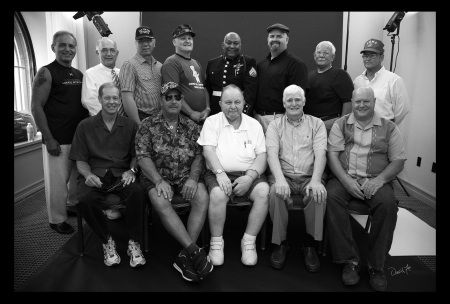
All comments and messages are approved by people and self promotional links or unacceptable comments are denied.
Matt Johnson April 7, 2011 6:18 pm (Pacific time)
I am very impressed with this Marine's story, unbelievable how the recruiter duped him mom into signing the papers! Thanks for your service Ed.
Colli April 7, 2011 12:18 pm (Pacific time)
The sad part is that there is nothing the government can do that would ever make-up to these men that which they have lost. The question is will they try?
[Return to Top]©2025 Salem-News.com. All opinions expressed in this article are those of the author and do not necessarily reflect those of Salem-News.com.